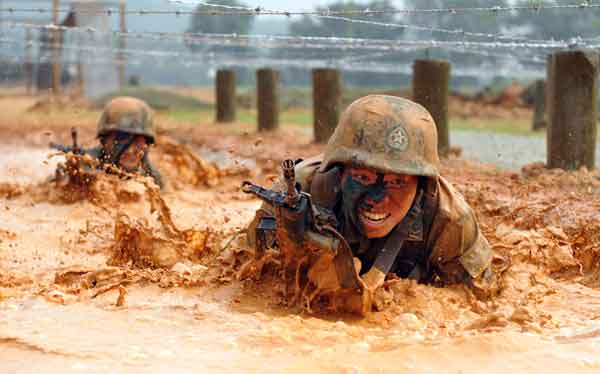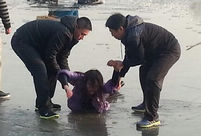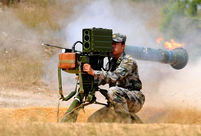 Shocking moments when PLA's weapons open fire
Shocking moments when PLA's weapons open fire Famous Lanzhou beef noodles
Famous Lanzhou beef noodles Armed Police hold anti-terrorism drill in SE China's Xiamen
Armed Police hold anti-terrorism drill in SE China's Xiamen Harbin Int'l Ice and Snow Festival opens
Harbin Int'l Ice and Snow Festival opens 'Jin' named the word of the year by cross-strait netizens
'Jin' named the word of the year by cross-strait netizens Chinese scientific expedition goes to build new Antarctica station
Chinese scientific expedition goes to build new Antarctica station
 Chinese naval escort fleet conducts replenishment in Indian Ocean
Chinese naval escort fleet conducts replenishment in Indian Ocean 17th joint patrol of Mekong River to start
17th joint patrol of Mekong River to start China's moon rover, lander photograph each other
China's moon rover, lander photograph each other |
| Troops crawl under barbed wire during a drill in May. Hard training is behind Sixth Company’s honors and achievements. Provided to China Daily |
Company anecdotes
It's not always easy to tame new recruits, who were mostly born in the 1990s and often arrive with a rebellious and arrogant attitude toward everything, or to put them through the tough training to achieve good results in military competitions.
To train these spoiled sons, the company fosters their sense of honor by requiring them to learn about its stellar history.
"Throughout its 74 years, our company has been involved in 161 battles, big and small. That honorable history is our trump card," said Huan.
Each new recruit is asked to remember anecdotes about founders of the company and, after several months, to serve as a guide at its honor hall where about 200 relics and 300 photographs of the company are displayed.
"It's never an easy task to remember every word in a book about the company's history that has hundreds of thousands of words. I often heard complaints such as, ‘If someone is able to recite all this material, he or she would qualify for a renowned university for their talent, rather than being recruited for the army,'" Huan said.
With that sense of honor in mind, members of the company show their edge in exercises and competitions — over the past 10 years, the company has fielded 62 champions in competitions held by a division or higher-level military unit.
Other company requirements include respecting each soldier's talent and teamwork-building.
Huan said that Wang, the son of a well-off family, found it hard to get used to life in the army when he first joined in December 2012.
As Wang, 19, put it, before he joined the army he had a lifestyle of surfing the Internet during the daytime and seeking fun in bars at night.
Many other recruits had been pampered by their families before joining the army. One mother, in an effort to get her son to behave better, even resorted to lying to him that she had cancer.
Wang showed a great talent for shooting while long-distance running was his weak spot.
"I told the company leaders that I'd rather sleep in a pigsty than run five kilometers," Wang said.
To help him improve, Wang took part in special sharpshooter training, and a squad leader was asked to teach him running skills, such as how to regulate his breathing.
He used to lag so far behind during team running events that he had to be dragged with a rope by three people to keep up. But he is no longer afraid of running.
He also made remarkable progress in the shooting program.


 In photos: Ten 'tuhao' devices in 2013
In photos: Ten 'tuhao' devices in 2013 College students saved from an ice hole by brave citizens
College students saved from an ice hole by brave citizens Gallery: Top 10 box office hits in 2013
Gallery: Top 10 box office hits in 2013 Beautiful churches around the world
Beautiful churches around the world Yang Mi, Hawick Lau hold wedding in Bali
Yang Mi, Hawick Lau hold wedding in Bali 'Phubbing' people seen everywhere
'Phubbing' people seen everywhere World's biggest snack shop in China
World's biggest snack shop in China Shocking moments when PLA's weapons open fire
Shocking moments when PLA's weapons open fire World's fastest train CRH380A assembled in E China
World's fastest train CRH380A assembled in E China Top 10 box office hits in 2013
Top 10 box office hits in 2013 In photos: Ten 'tuhao' devices in 2013
In photos: Ten 'tuhao' devices in 2013 Real estate tycoon measures PM2.5
Real estate tycoon measures PM2.5  'I am on a journey to lose weight'
'I am on a journey to lose weight' 'Cute' artifacts exhibited in Nanjing Museum
'Cute' artifacts exhibited in Nanjing Museum Advanced Chinese weapons that stepped into spotlight in 2013
Advanced Chinese weapons that stepped into spotlight in 2013Day|Week|Month